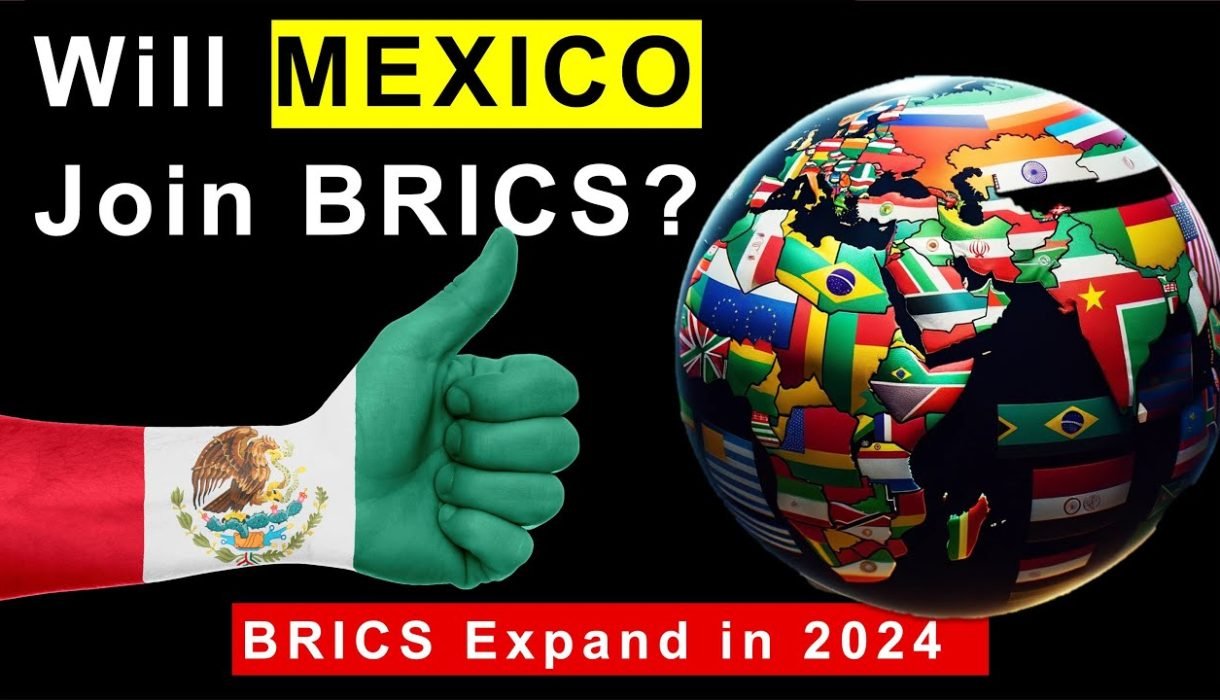
Mexico’s Bold Move: The Potential Shift towards BRICS and Its Global Implications
Posted in :
Mexico and BRICS: A Bold Geopolitical Shift
Exploring Mexico’s potential decision to join the BRICS economic bloc and what it means for its international relations, economy, and global power dynamics.
As the world order shifts, Mexico stands at a crossroads, contemplating a decision that could redefine its future. The possibility of Mexico joining BRICS—an alliance comprised of Brazil, Russia, India, China, and South Africa—opens the door to a myriad of opportunities and potential pitfalls. What does this mean for the country’s traditional ties and its place in the global economic landscape?
Understanding BRICS: What’s at Stake for Mexico?
As discussions heat up around Mexico’s potential entry into the BRICS group, the implications are profound. BRICS, which stands for Brazil, Russia, India, China, and South Africa, represents a coalition of emerging economies reshaping the global landscape. This bloc is not just a collection of nations; it symbolizes a shift in power dynamics that could redefine Mexico’s role on the world stage.
Overview of BRICS Formation
BRICS was formed in the early 2000s, initially as a way for these nations to collaborate on economic issues. The significance of this coalition cannot be overstated. Together, BRICS countries account for over 40% of the global population and nearly 30% of the world’s GDP. This economic weight gives them considerable influence in global affairs.
In recent years, the BRICS nations have been increasingly vocal about their desire to challenge Western dominance. They are not just emerging markets; they are becoming powerhouses in their own right. As an economic analyst noted,
“The world is witnessing a shift where emerging economies take front stage in geopolitics.”
The Growing Influence of Emerging Markets
Emerging markets like those in BRICS are challenging the traditional economic order. For decades, Western nations, particularly the United States, have held the reins of global finance and trade. However, as BRICS countries grow, they are creating new opportunities and alliances that could rival Western influence.
- BRICS nations are diversifying their economic relationships.
- They are investing in technology, energy, and infrastructure.
- Trade among BRICS countries exceeds $6.4 trillion annually.
This shift is not just about economics; it’s also about political power. Mexico’s potential accession to BRICS could be a strategic move to align with these emerging economies, particularly as it seeks to diversify its relationships beyond the U.S.
Current Trade Statistics and Economic Growth
Current trade statistics paint a compelling picture of BRICS’ economic growth. In 2022, the economic growth rate of BRICS countries outpaced that of the G7 by 5%. This trend indicates that these nations are not just growing; they are doing so at an accelerated pace compared to their Western counterparts.
For Mexico, joining BRICS could open doors to new markets. With access to countries that represent 40% of the world’s population, Mexico could reshape its economic future. This is particularly significant given that the U.S. has been Mexico’s largest trading partner for decades. However, the question remains: what would this mean for Mexico’s existing trade relationships?
Risks and Rewards of Joining BRICS
While the potential benefits of joining BRICS are substantial, the risks are equally daunting. Mexico’s economy relies heavily on its relationship with the U.S., which accounts for over 80% of its exports. Entering BRICS could jeopardize this strategic alliance.
There are concerns that the U.S. might respond negatively to Mexico’s shift. Economic sanctions or demands for renegotiation of trade terms could destabilize Mexico’s economy. The stakes are high. Aligning with BRICS nations, some of which are in conflict with Western powers, could place Mexico in a precarious position.
Moreover, the interconnectedness of the global economy means that even minor diplomatic missteps could lead to significant financial repercussions. Mexico’s potential dual role as a BRICS member while maintaining ties with the U.S. could enhance its global standing or lead to geopolitical fallout.
The Broader Implications for Latin America
The implications of Mexico joining BRICS extend beyond its borders. Historically, Latin America has been viewed as a sphere of influence for the U.S. A united Latin American bloc within BRICS could empower regional nations to negotiate from a position of strength. This shift could lead to a more independent regional voice in global matters.
As Mexico stands at this critical juncture, the decisions made could usher in a new era of economic independence or prolonged geopolitical turmoil. The conversation is ongoing, and the stakes are high. Is Mexico ready to embrace these profound changes, or will the risks incurred impede its advancement on the world stage?
Implications of Joining BRICS: Opportunities and Challenges
As Mexico contemplates joining the BRICS group, the implications are profound. This coalition includes Brazil, Russia, India, China, and South Africa. Each of these nations represents a significant portion of the global economy. The potential benefits and risks of joining this bloc are crucial for Mexico’s future.
Potential Economic Benefits
Joining BRICS could open new doors for Mexico. The economic benefits are enticing:
- Increased Trade: BRICS nations already engage in over $6.4 trillion in annual trade. Mexico could tap into this vast market.
- Access to Resources: Membership could provide Mexico with access to energy and technology resources, crucial for its growth.
- New Development Bank: This bank funds projects without the stringent conditions often imposed by Western institutions.
These opportunities could significantly boost Mexico’s economy. But, the question remains: Is the potential growth worth the risks involved?
Risk Factors
While the benefits are clear, the risks cannot be overlooked. Mexico’s economic ties to the U.S. are a double-edged sword. Here are some concerns:
- Tensions with the U.S.: The U.S. has been Mexico’s largest trading partner for decades. A shift towards BRICS could strain this relationship.
- Trade Reprisal Risks: The U.S. might respond with economic sanctions or demand renegotiations of existing trade agreements, like the USMCA.
- Geopolitical Conflicts: Aligning with BRICS could place Mexico in a precarious position, especially with countries that have strained relations with the West.
Political strategist remarks,
“Joining BRICS may bring growth, but it’s a delicate dance with existing alliances.”
This highlights the balancing act Mexico must perform.
Historical Context
Looking back at history provides valuable lessons. Several countries have joined new economic blocs, with varying outcomes. For instance:
- Eastern European Nations: After the fall of the Soviet Union, many Eastern European countries joined the EU. This move led to significant economic growth.
- Argentina: In the early 2000s, Argentina shifted towards regional alliances, which initially boosted its economy but later led to instability.
These examples illustrate that while joining a new bloc can bring opportunities, it can also lead to unforeseen challenges. Mexico must consider these historical precedents as it weighs its options.
Impact on TEMEC Relations
The potential shift towards BRICS raises questions about the future of the TEMEC agreement. Currently, over 80% of Mexico’s exports go to the U.S. This relationship is formalized through trade agreements that could be jeopardized by a move towards BRICS.
Could Mexico risk its economic stability for the allure of BRICS? The interconnectedness of the global economy means even minor diplomatic missteps could have significant repercussions. Mexico’s dual position—being part of BRICS while maintaining ties with the U.S.—could either enhance its global role or lead to geopolitical fallout.
Regional Implications
Mexico’s decision could resonate throughout Latin America. Historically, the region has been seen as under U.S. influence. A united Latin American bloc within BRICS could empower these nations to negotiate from a position of strength. This shift could foster a more independent regional voice in global matters.
As Mexico stands at this critical juncture, the stakes are high. The potential for enhanced economic independence exists, but so does the risk of prolonged geopolitical turmoil. The conversation surrounding this decision is vital. Is Mexico ready to embrace these profound changes? Or will the risks incurred impede its advancement on the world stage?
The trajectory of both Mexico and Latin America hangs in the balance as they deliberate these game-changing prospects.
The Broader Perspective: Impact on Latin America
As Mexico contemplates joining the BRICS coalition, the implications extend far beyond its borders. This decision could set a significant precedent for other Latin American nations. The potential for regional cooperation against U.S. influence is palpable. It raises questions about how Latin America can collectively strengthen its position in global affairs.
Setting a Precedent for Latin America
Mexico’s potential accession to BRICS could inspire other Latin American countries to reconsider their economic alliances. Historically, these nations have faced challenges in uniting for a common economic front. The idea of a united Latin America is not new, but it has often been stymied by political differences and economic disparities.
However, if Mexico successfully joins BRICS, it might encourage other countries in the region to follow suit. The BRICS alliance, which includes Brazil, Russia, India, China, and South Africa, represents a formidable bloc with significant global influence. By aligning with such a coalition, Mexico could signal to its neighbors that a shift in economic strategy is not only possible but beneficial.
Potential for Regional Cooperation
One of the most compelling aspects of Mexico’s potential membership in BRICS is the opportunity for regional cooperation. The U.S. has historically dominated Latin America’s economic landscape. Yet, the rise of BRICS presents a chance for Latin American nations to band together against this influence.
Imagine a scenario where countries like Argentina, Chile, and Colombia join Mexico in BRICS. Together, they could negotiate trade agreements that prioritize regional interests over external pressures. This collective approach could empower Latin American nations to negotiate from a position of strength, rather than relying on the U.S. for economic stability.
As a Latin American historian noted,
“If Mexico succeeds in joining BRICS, it could herald a new era of regional cooperation.”
This sentiment captures the essence of what is at stake. The potential for a united front could reshape the geopolitical landscape of the region.
Imagining a Collective Economic Strategy
What would a collective economic strategy look like for Latin America? It could involve shared investments in technology, energy, and infrastructure. By pooling resources, these nations could develop projects that benefit the entire region rather than individual countries. This strategy could also reduce dependency on traditional financial institutions, which often impose strict conditions on loans.
For example, the New Development Bank, established by BRICS, offers funding for projects without the conditionalities that come from Western financial institutions like the IMF or World Bank. This could provide Mexico and its neighbors with the financial flexibility to pursue their development goals without external interference.
However, the risks associated with such a shift cannot be ignored. Aligning with BRICS could jeopardize Mexico’s longstanding relationship with the U.S., which accounts for over 80% of its exports. The U.S. could respond with economic sanctions or demands for renegotiation of trade terms, destabilizing Mexico’s economy.
Mexico stands at a critical juncture. The decision to join BRICS could usher in a new era of economic independence and unity for Latin America. Alternatively, it could lead to prolonged geopolitical turmoil. The stakes are high, and the trajectory of both Mexico and the broader region hangs in the balance. As discussions continue, the question remains: Is Mexico ready to embrace these profound changes, or will the risks impede its advancement on the world stage?
Understanding how regional dynamics foster global shifts in the economic landscape can empower nations. The potential for a united Latin America, free from historical dependency on the U.S., is within reach. The time for decisive action is now.
TL;DR: Mexico’s potential join of BRICS symbolizes a pivotal shift in its economic and geopolitical stance, with significant implications for its future relations and global positioning.
BRICSExpansion, MexicoDollarTransition, TradeRelations, MexicoRussia, EmergingEconomies, GeopoliticalImpact, MexicoBRICS
#EmergingEconomies, #MexicoRussia, #BRICSExpansion, #MexicoDollarTransition, #TradeRelations, #GeopoliticalImpact, #MexicoBRICS,#MexicoBRICS, #GlobalPolitics, #Geopolitics, #LatinAmerica, #EmergingMarkets, #InternationalRelations, #GlobalEconomy, #USMexicoRelations, #BRICSCountries, #EconomicShift

